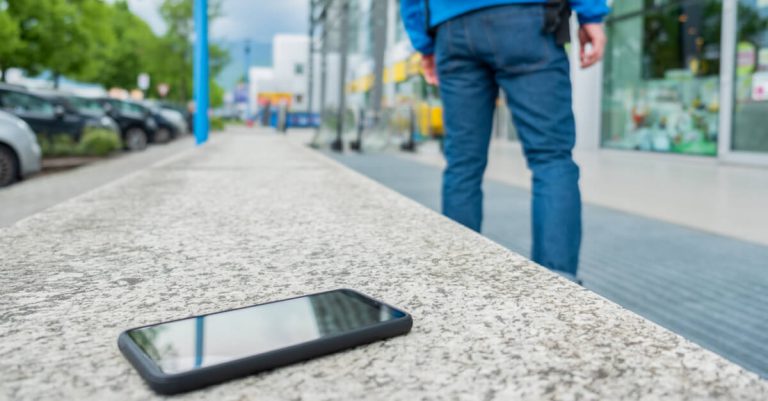Familiar with that sudden heart pounding feeling of dread when you realise that you had left something precious behind?
A recent study found that around 1 million smartphones are stolen every day worldwide, with only 7% being recovered. Closer to home, Singapore police reported that nearly 4,000 shoplifting cases occurred in 2023, including numerous personal devices taken from public places.
Misplacing a personal device in a public place like a Grab car, café, or MRT station puts your sensitive information at risk, potentially leading to identity theft, financial fraud, or data hacking. Read on to find out why this happens, and how you can minimise your losses.
What happens when you lose a personal device?
Akin to a hive where we store our personal and confidential data, personal devices like our smartphones and laptops are daily essentials among most people. There are actually more risks and potential costs involved in addition to the inconvenience of getting a replacement for your lost personal device.
1. Loss of intellectual property
With the flexibility of remote work, the occasional commuting with our work laptop is inevitable. Have you ever wondered what happens if you lose it on the train or in a Grab car on your way home?
Beyond the replacement cost of the laptop, what is more costly would be highly confidential details of your latest project or the contact information of your clients. If your personal device happens to fall into the hands of those with malicious intent, these information can be sold and used against you and your organisation. Continue reading to learn more on what you can do if you encounter (touch wood!) cyber extortion.
2. Disruption to daily life
Losing your personal device goes beyond just the physical inconvenience. It can interrupt your daily routine in many ways, such as missing important meetings when you can’t access your digital calendar, or worrying about personal photos, messages, or documents being exposed.
Today, our phones carry everything — banking apps, Singpass, health records, PayNow, and transport access. Misplacing your device could mean being locked out of essential services and unable to carry out daily tasks.
More concerning is the growing threat of digital identity theft. In recent local cases, scammers have used stolen Singpass credentials to apply for loans or access CPF savings. If your phone isn’t properly secured, it could lead to unauthorised transactions, financial loss, or reputational damage.
3. Loss of personal information
Have you heard about the recent news on stolen NRIC numbers that were sold and used for fraudulent sign-ups of mobile plans? If you have the habit of storing a copy of your NRIC on your phone or laptop, do beware and ensure that it is stored in a secured folder.
Your home address and sensitive data such as your banking account details could be leaked, and used or sold for malicious intent.
#TiqOurWord When all else fails, know that all is not lost if you have an insurance plan that covers a wide range of cyber security breaches such as cyber fraud and identity theft. Consider it as a safety net, with a generous coverage of up to S$25,000, with the Personal Cyber Insurance.
4. The effort it takes to restore the lost information
Post-recovery, even the simple task of gathering all your lost contacts and setting up a new device would still take considerable time and effort, not to mention potential legal and administrative fees and opportunity costs.
What can you do to minimise the risks?
While trying to be extra careful is the best form of prevention, here are some precautions you can take:
- Back up your important data frequently.
- Install a trusted location tracking software/application on your personal device.
- Set your device to go into lock-up/sleep mode after a period of inactivity and set a password.
- Try not to store passwords on your device, instead use a password vault.
- Ensure you are adequately covered in the event of cyber security breaches. Learn more about Personal Cyber Insurance from Tiq by Etiqa here
What to do if you lose your personal device?
Should the damage be done, here’s what you can do:
Contact your bank and mobile carrier. If you have the habit of using virtual credit cards or storing physical credit card numbers on your device, it’d be easy to get a new replacement card. Stay alert to prevent unauthorised card transfers.
If your smartphone were among the items lost, contacting your service provider will enable them to quickly lock your SIM card and suspend service to your device in order to prevent misuse.
Report the incident to your local authorities. With police cameras in every corner, chances of recovering a lost item has increased. Also, a police report is needed for making an insurance claim. As part of the reporting procedure, the police may collect additional details of your lost device such as the serial number or IMEI number which will then be added to the police database. This information will then be used when they find a match.
If the item was misplaced at commonly traversed places like the airport or on the MRT, you can try reaching out to the dedicated lost and found department directly.
Check your frequently used online accounts. Apart from changing passwords, enhanced security features like being able see recent IP addresses that have recently logged into your account and being able to remotely log out your own account from every known device comes in very handy.
Take your search online. The internet offers limitless reach, and you can boost your chances of recovery by posting a detailed lost-and-found notice on online community platforms or forums.
Contact your insurer. Reach out to your insurer if you have cyber protection like our Personal Cyber Insurance. Confirm you are a cybercrime victim. Your insurer will guide you and assist with claims.
Do you really need Personal Cyber Insurance?
Simply put, losing a personal device can be devastating, but the repercussions of cyber security threats can be worst. Personal Cyber Insurance from Tiq by Etiqa can protect you and your household members from online threats with a coverage of up to S$25,000 a year. Keep a lookout for our Friday promotions to enjoy further discounts! Find out more here.
[End]
Information is accurate as at 10 December 2020. This policy is underwritten by Etiqa Insurance Pte. Ltd. (Company Reg. No. 201331905K).
This article was updated on 23 July 2025.
Tiq by Etiqa Insurance Pte. Ltd.
A digital insurance channel that embraces changes to provide simple and convenient protection, Tiq’s mission is to make insurance transparent and accessible, inspiring you today to be prepared for life’s surprises and inevitabilities, while empowering you to “Live Unlimited” and take control of your tomorrow.
With a shared vision to change the paradigm of insurance and reshape customer experience, Etiqa created the strong foundation for Tiq. Because life never stops changing, Etiqa never stops progressing. A licensed life and general insurance company registered in the Republic of Singapore and regulated by the Monetary Authority of Singapore, Etiqa is governed by the Insurance Act and has been providing insurance solutions since 1961. It is 69% owned by Maybank, Southeast Asia’s fourth largest banking group, with more than 22 million customers in 20 countries; and 31% owned by Ageas, an international insurance group with 33 million customers across 16 countries.
Discover the full range of Tiq online insurance plans here.








